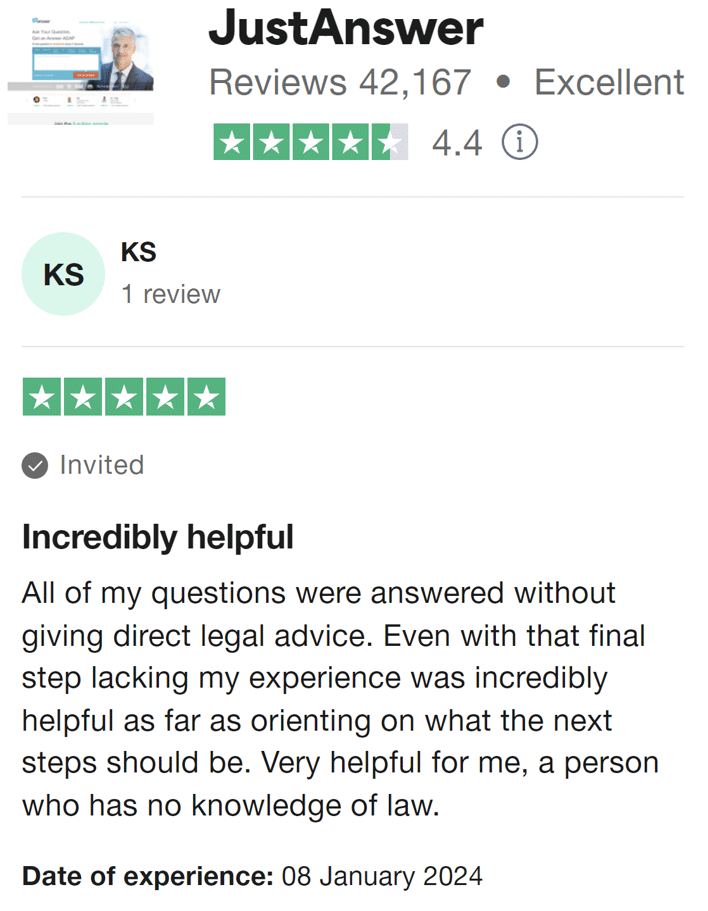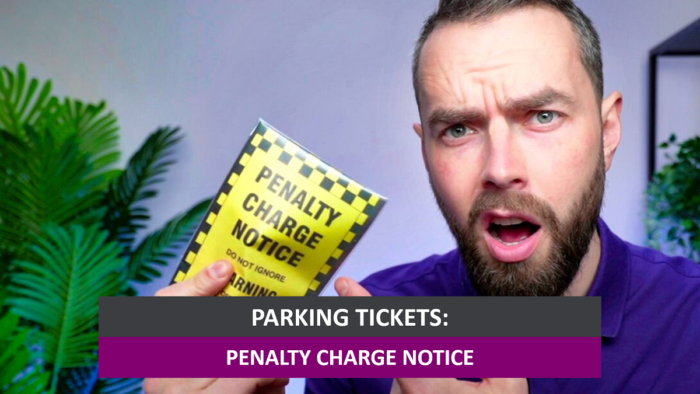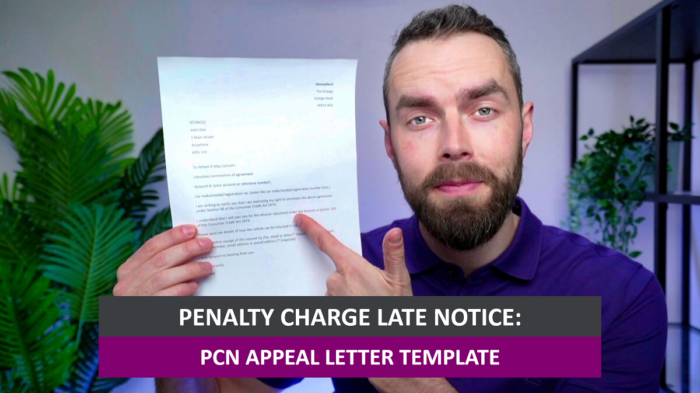Conditional Offer of Fixed Penalty Notice – Pay or Appeal? UK Laws
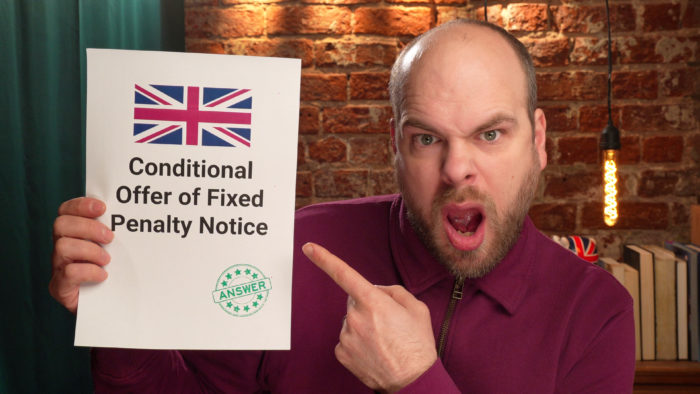
Have you just received a Fixed Penalty Notice? Are you unsure whether to pay it or fight it? This article will help clear up your worries. Every month, over 130,000 people turn to our website for advice on fines and parking tickets.
This easy-to-understand guide will explain:
- What a Fixed Penalty Notice means.
- When you should pay a Fixed Penalty Notice.
- How you can fight a Fixed Penalty Notice.
- Times when you might not need to pay.
- What could happen if you ignore the notice.
A group of MPs and Peers are worried about Fixed Penalty Notices. They say FPNs, which can cost up to £10,000, are hard to understand and might be unfair.1
We understand that getting a Fixed Penalty Notice can make you feel upset, but don’t worry; we are here to help with lots of useful tips and examples. Remember, you’re not alone; many people have been in your shoes before and found a way through.
Let’s get started and find the best way for you to deal with your Fixed Penalty Notice.
Most Appeals Succeed
In some circumstances, you might have a legitimate reason not to pay your fine.
It’s a bit sneaky, but the last time I needed legal advice, I paid £5 for a trial to chat with an online solicitor called JustAnswer.
Not only did I save £50 on solicitor feeds, I also won my case and didn’t have to pay my £271 fine.
Chat below to get started with JustAnswer
*Around 35,000 people dispute their tickets each year with the Traffic Penalty Tribunal, and a striking 64% of those appeals are successful, so it’s well worth a try.
What happens when you get a speeding fine?
You can get caught speeding in one of three ways:
- By fixed roadside speed cameras (which may or may not flash!)
- Via mobile speed camera vans
- When a police officer stops you
If you’re caught speeding on any camera, the police will use the vehicle registration number to identify the registered keeper.
They can then send the registered keeper an Notice of Intended Prosecution (NIP).
If a police officer stops you, they can give a verbal NIP instead.
After receiving an NIP in the post, the vehicle owner has 28 days to return an attached form.
This form allows the vehicle owner to place blame on someone else who was driving at the time, which may be the case if the vehicle is shared between friends or family members.
After returning the attached form, the police have up to six months to issue the person who was speeding a Fixed Penalty Notice (FPN).
It’s the FPN which is the actual speeding ticket and the real speeding fine.
What does the offer mean on a speeding fine?
A conditional offer is included in the Fixed Penalty Notice and states the conditions that must be met to end the speeding case without prosecution.
Thus, you must agree and follow the conditions stipulated to avoid legal action against you.
The conditions included in a Fixed Penalty Notice are typical you must:
- Pay a fine
- Accept points on your license
- Do the above by a deadline
How much is it?
The minimum you will be asked to pay as part of a conditional offer of a Fixed Penalty Notice is £100.
The most you can pay for speeding on a motorway is £2,500 and £1,000 on other roads.
However, the real cost within the conditional offer is based on how much over the speed limit you travelled and your weekly income.
For example, the more you speed the greater percentage of your weekly income you’ll be fined.
But the amount is always within the minimum and maximum caps.
How many points will you have to accept?
The conditional offer within a Fixed Penalty Notice could also ask you to accept penalty points on your license.
The minimum number of penalty points you’ll be asked to accept is three (3).
You could also be given a short-term or long-term driving ban for serious speeding offences.
You won’t have to accept any penalty points on your license if you are instead offered to go on a speed awareness course and accept.
The speed awareness course isn’t free of charge.
You’re more likely to be offered a speed awareness course instead of penalty points if it was a minor speeding offence.
You cannot do more than one speed awareness course within a three-year period, and they’re not available to drivers who commit any speeding offence in Scotland.
Successful Appeal Case Study
Situation
| Initial Fine | £100 |
| Additional Fees | £171 |
| Total Fine | £271 |
The Appeal Process
Scott used JustAnswer, online legal service to enhance his appeal. The trial of this cost him just £5.
| Total Fine | £271 |
| Cost of legal advice | £5 |
JustAnswer helped Scott craft the best appeal possible and he was able to win his case.
Scott’s fine was cancelled and he only paid £5 for the legal help.
In partnership with Just Answer.
Understanding speeding bands
There are three speeding bands which are as follows:
- Band A if you are caught speeding between 31-40 mph in a 30-mph zone
- Band B If you are doing between 41-50 mph in a 30-mph zone
- Band C if you are caught doing 51 mph or above in a 30-mph zone
Check out what happened to one motorist who posted this message on a popular online forum.
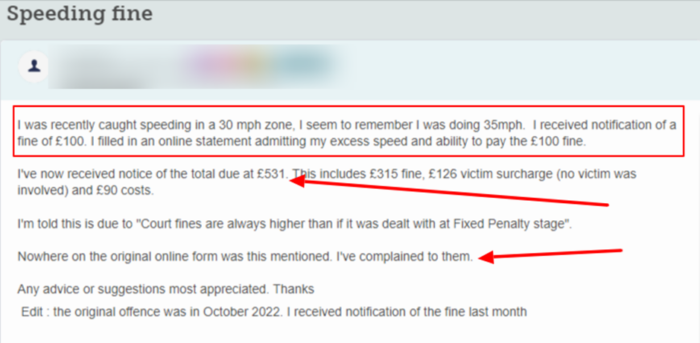
Source: Moneysavingexpert
Do you always receive one?
No, offending drivers don’t always receive a Notice of Intended Prosecution followed by a Fixed Penalty Notice.
If the speeding offence was excessive, or if the driver already has eight (8) or more penalty points on their license, the police can choose to prosecute.
In these cases, the police have up to six months to send court summons.
Will an FPN affect my driving record?
Yes, if you’re given penalty points and a fine, it will appear on your driving record.
As such, your insurance premium will go up. Plus, you must inform your insurers of it could invalidate your cover.
» TAKE ACTION NOW: Get legal support from JustAnswer
Can I appeal it?
There are some UK police forces that accept a speeding fine appeal.
However, in most cases, you can’t appeal.
Instead, you must challenge the speeding ticket in court.
This means you won’t accept the conditional offer of the Fixed Penalty Notice and you allow the case to escalate to court.
There are limited reasons why a judge would side with you, such as:
- The vehicle has been stolen
- You weren’t the person driving (unless you failed to respond to the NIP!)
- The speed limit signs were missing
- You weren’t speeding – which can be hard to prove
- It wasn’t your vehicle and there has been an error
For a complete list of valid reasons for an appeal, please check out the table below.
| Violation Category | Specific Offense | Common Appeal Reason |
|---|---|---|
| Traffic Signal | Running a Red Light | Traffic light was malfunctioning/out |
| Insurance | Driving without Insurance | Proof of valid insurance at the time |
| Speed Limit | Exceeding Speed Limit | Incorrect speed limit signage/malfunctioning speedometer |
| Seat Belt | Not Wearing a Seat Belt | Belt was worn but not visible or medical exemption |
| Mobile Phone Use | Using a Mobile Phone while Driving | Emergency situation or not in use |
| Vehicle Condition | Driving a Vehicle in Poor Condition | Recent vehicle maintenance or misjudgment of condition |
| Parking | Illegal Parking | Unclear, obscured, or misleading parking signs |
| Documentation | Failure to Display Tax Disc | Disc was displayed but not visible |
| Driving License | Driving without a Valid License | License was valid but not present |
| Vehicle Registration | Driving Unregistered Vehicle | Registration was in process/delayed |
How to pay
The police will accept multiple payment methods when you want to pay your speeding fine.
All of the methods and specific details will be listed on the Fixed Penalty Notice.
Should I get a legal representation?
You could get legal representation if you’re facing a driving ban and need your licence to carry out your job.
That said, there’s never any guarantee that you would get off even when represented by a solicitor.
How much will it cost to challenge it?
The cost of challenging an FPN for speeding could be prohibitive.
That said, if you need a driving licence to carry out your work, it could be worth considering.
However, as I see it, you should weigh up the costs and the consequences of losing your licence beforehand.
Join thousands of others who got legal help for a £5 trial
Getting the support of a Solicitor can take a huge weight off your mind.
Reviews shown are for JustAnswer.
How serious is an FPN?
Fixed Penalty Notices are not criminal offences and won’t result in a criminal conviction.
If you accept liability and meet the conditions of the Fixed Penalty Notice, that’s the end of the matter.
However, your insurance premiums may increase after accepting penalty points within the conditional offer.
Can I hire a car with points?
Although each car hire company has its own hiring policy.
But, as a rule of thumb, most will only accept hiring cars to people who have a maximum of six points on their licences.
How can I avoid paying?
The only way to avoid paying a Fixed Penalty Notice is to make a successful appeal or win in court.
If you ignore it then the case will escalate to court where you’ll be prosecuted.
In court, you’ll likely be served with a much more significant fine.
So it’s always better to take action than to ignore a Fixed Penalty Notice.
Should I appeal or accept it?
Only make an appeal or allow the case to go to court if you’re certain you will win.
Otherwise, you’ll be hit with a bigger fine.
In the majority of cases, it’s much better to accept the conditional offer of Fixed Penalty Notices.
Hire a Solicitor for less than a coffee.
If you’re thinking about appealing your FPN then getting some professional advice is a good idea.
Getting the support of a Solicitor can make your appeal much more likely to win.
For a £5 trial, Solicitors from JustAnswer can look at your case and help you create an airtight appeal.
Try it below
In partnership with Just Answer.
